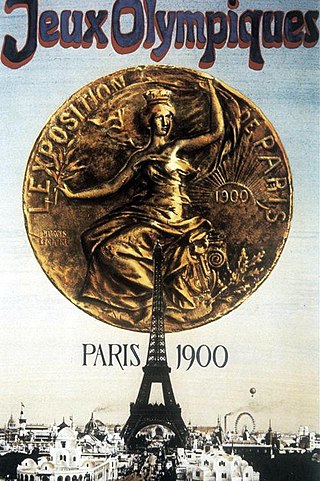
The 1900 Summer Olympics, today officially known as the Games of the II Olympiad and also known as Paris 1900, were an international multi-sport event that took place in Paris, France, from 14 May to 28 October 1900. No opening or closing ceremonies were held. This were the very first Summer Olympics ever held in a non-leap year until the 2020 Summer Olympics, which delayed to 2021 due to the COVID-19 Pandemic.
At the 1900 Summer Olympics, seven of the archery events that took place in Paris, France, are considered to be "Olympic" by Olympic historians, with 153 archers competing. The identities of 17 of those archers are known, though a number of those are known only by their surnames.

At the 1900 Summer Olympics, three croquet events were contested. Seven men and three women participated. The doubles competition was scheduled first, though it is unclear whether the French pair that won had any competition. The one-ball singles was played the next week, followed by two-ball singles the week after. France, which supplied all 10 competitors, therefore won all the medals.
Five equestrian competitions were held from 29 May to 2 June 1900 at the Concours Hippique International in Paris as part of the Exposition Universelle. The events were later classified as part of the 1900 Summer Olympics. The events were organised by the Société hippique française, with competitors from eight countries competing in three jumping and two driving events at the Place de Breteuil in the 7th arrondissement of Paris.

At the 1900 Summer Olympics, a Basque pelota tournament was contested.

At the 1900 Summer Olympics in Paris, seven swimming events were contested. Only men competed in the swimming competition. There was a total of 76 participants from 12 countries competing. The games are referenced in Yann Martel's 2001 novel Life of Pi. As with the rowing events, swimming took place on the Seine between the Courbevoie Bridge and the Asnières Bridge.

Basque pelota is the name for a variety of court sports played with a ball using one's hand, a racket, a wooden bat or a basket, against a wall or, more traditionally, with two teams face to face separated by a line on the ground or a net. The roots of this class of games can be traced to the Greek and other ancient cultures.

The men's long jump was a track & field athletics event at the 1900 Summer Olympics in Paris. It was held on July 14 and July 15, 1900. 12 athletes from six nations competed. The event was won by Alvin Kraenzlein of the United States, the second consecutive victory for the American team. Myer Prinstein, also an American, took silver. Patrick Leahy, an Irish athlete competing for Great Britain, took bronze; it was the first long jump medal for a non-American athlete as the United States had swept the 1896 medals.

Belgium competed at the 1900 Summer Olympics in Paris, France. It was the first appearance of the European nation. Belgium was represented in France by 78 athletes, all of them male, who competed in 11 disciplines. They comprised 95 entries in 28 events.

The modern Olympic Games were founded by French historian Pierre de Coubertin. France has competed in every edition, with the possible exception of the 1904 Games.

Spain competed at the modern Olympic Games for the first time at the 1900 Summer Olympics in Paris, France.

Spain first participated at the Olympic Games in 1900, and has sent athletes to compete in most Summer Olympic Games since 1920. Spain has also participated in every Winter Olympic Games since 1936. Its team is organised by the Spanish Olympic Committee created in 1924.
William George Saward was a British long-distance runner who competed at the 1900 Summer Olympics in Paris, France. Saward competed in the marathon. He was one of six runners who did not finish the race.
José de Amézola y Aspizua was a Spanish Basque pelotari who competed at the 1900 Summer Olympics in Paris, France.
Francisco Villota y Baquiola was a Spanish pelotari who competed at the 1900 Summer Olympics in Paris, France.
Maurice Durquetty was a French pelotari who competed at the 1900 Summer Olympics in Paris, France.

Basque Pelota was a demonstration sport at the 1992 Summer Olympics in Barcelona. It was the fourth and last time that the sport was included in the Olympic program; it was an official Olympic sport at the 1900 Games in Paris, and a demonstration sport in 1924 and 1968.
Basque Pelota was a demonstration sport at the 1924 Summer Olympics in Paris. It was the second time that the sport was included in the Olympic program; it was an official Olympic sport at the 1900 Games that were also held in Paris. It would be included as a demonstration in another two occasions at the 1968 Games in Mexico City and the 1992 Games in Barcelona.










